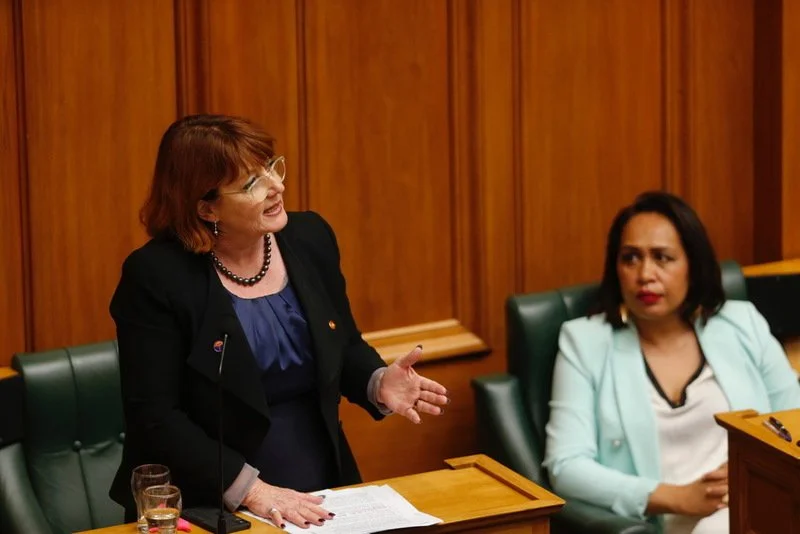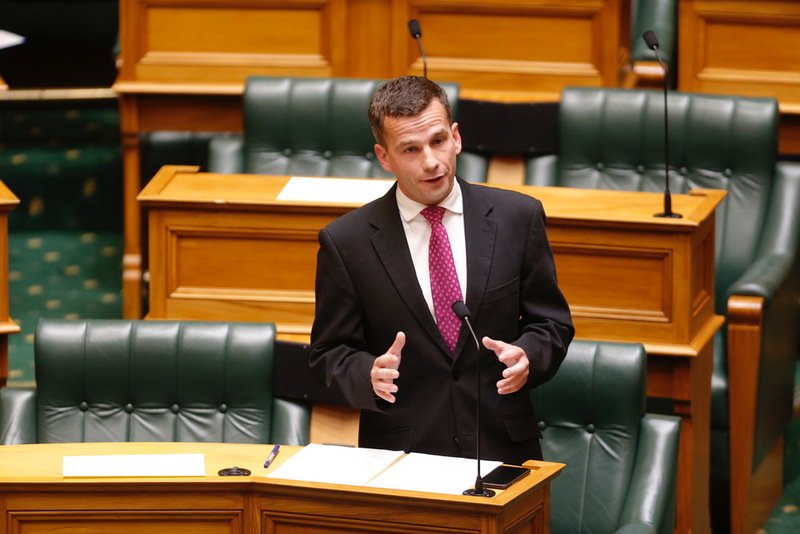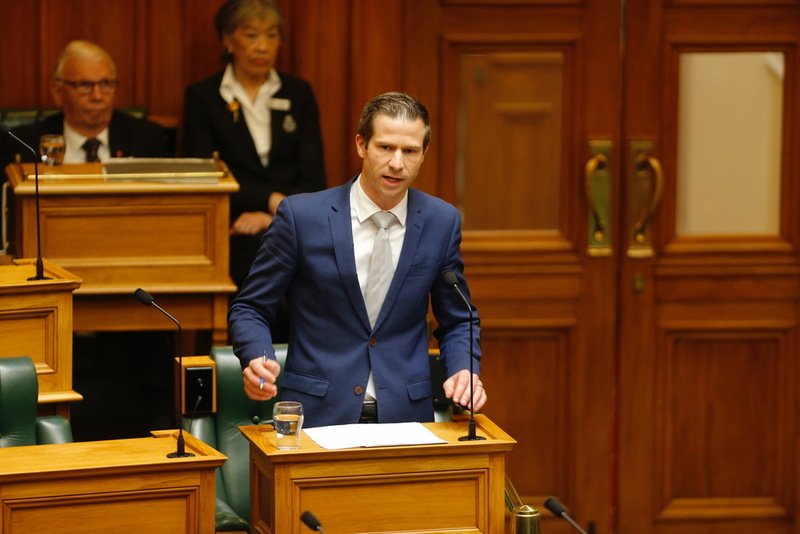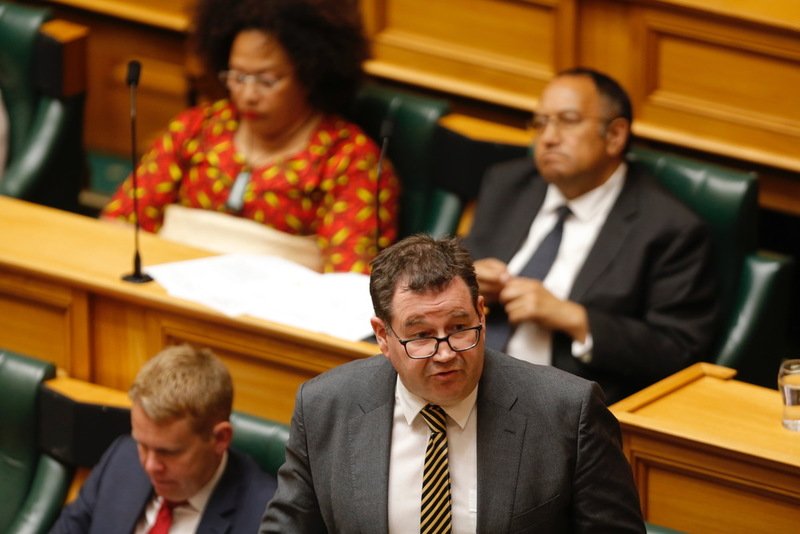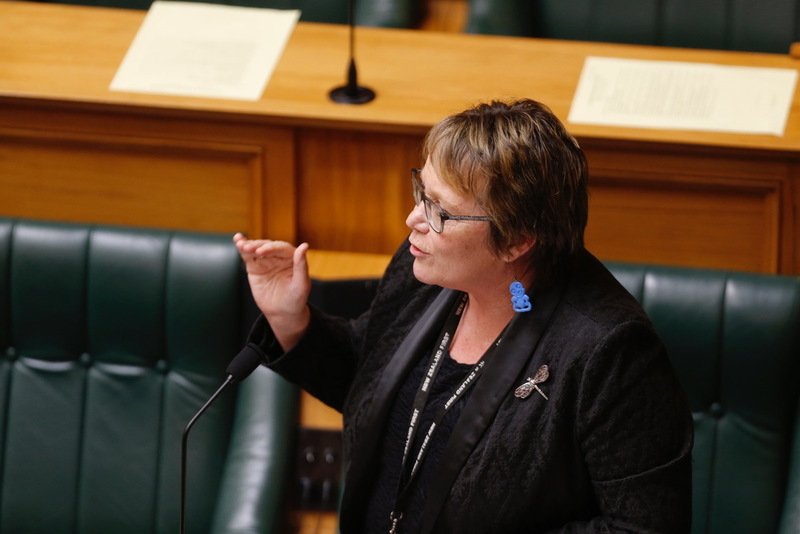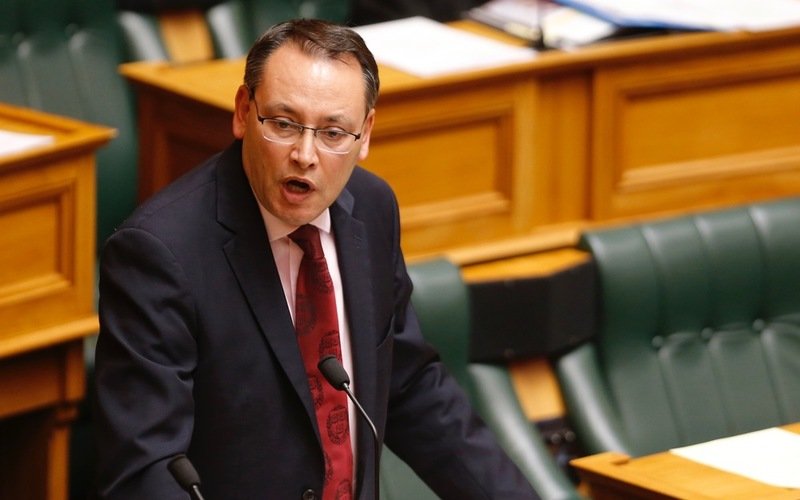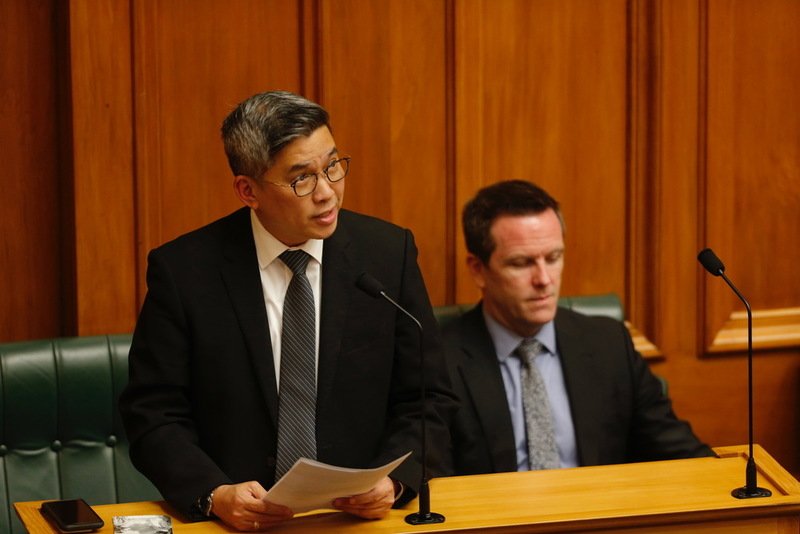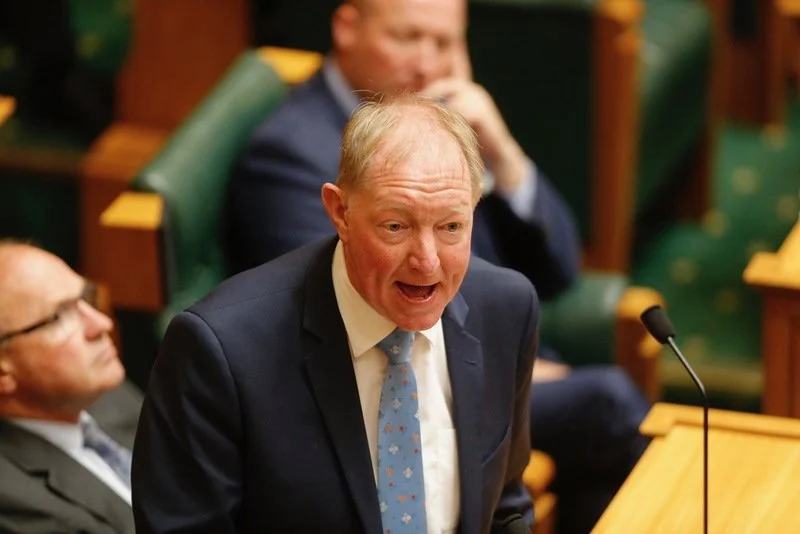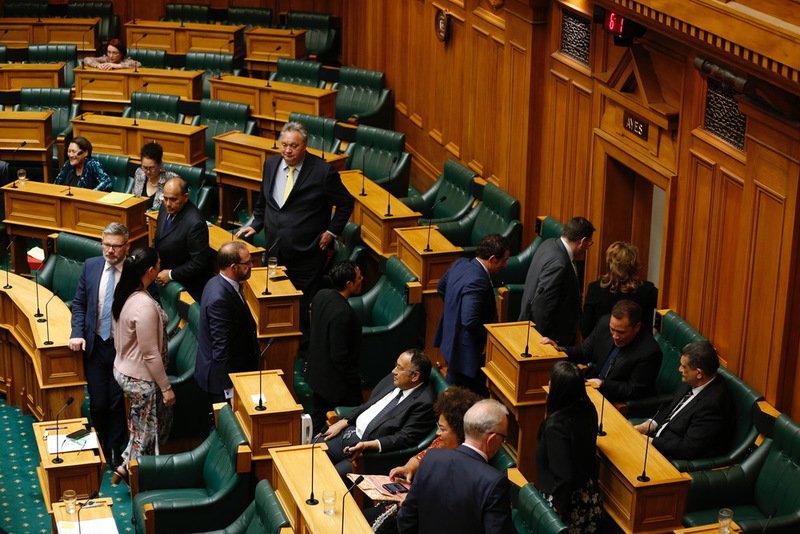By Henry Cooke
MPs have casted their final votes on the End of Life Choice Bill. That bill would set in motion a public vote on legalised euthanasia.
Good afternoon and welcome to Stuff's life coverage of the third and final reading of the End of Life Choice Bill.
If passed tonight New Zealand will vote in a referendum at the next election on whether or not euthanasia should be legalised for the terminally ill.
Act MP and sponsor of the bill David Seymour is speaking on the bill
He says up and down the country he has heard the same message from people: "I have seen bad death. If my times coming and I'm not doing well, I want death. And by the way it is nobody's choice but mine."
David Seymour speaks his End of Life Choice bill. Photo Credit: Ross Giblin/Stuff
Seymour is getting a ten minute speech, as several MPs will. Other MPs will just get five minute speeches.
He makes the point that other countries who have legalised euthanasia generally keep it. And he says that the people who use the service are usually not vulnerable given the legal hoops they have to jump for.
Chris Penk speaks against the bill. Credit: Ross Giblin/Stuff
National MP Chris Penk is the next speaker.
Penk, a first term MP for John Key's electorate of Helensville, is a fierce opponent of the bill.
"We ask ourselves if it is responsible for Parliament to hand a loaded gun to the public of New Zealand and say 'don't worry we've put on the safety catch,'" Penk says of the referendum.
He is criticising the wording of the referendum itself, which will have some variant of "Do you support the End of Life Choice Bill". Penk says this is a euphemism and people will confuse it with a do-not-resuscitate orders - which are already legal.
He ends his speech, close to tears, saying there will be wrongful deaths that happen because of this bill and no safeguard will stop that. He notes there is no "cooldown period" for someone who is diagnosed with terminal illness, which means they could end their life rapidly after.
The bill is likely to pass
I've asked every all the MPs how they will vote on the bill (or the parties in the case of the Greens and NZ First.)
Their answers suggest the bill will pass. 63 MPs told me they would vote yes - two more than the 61-vote majority needed. One more told me they were likely to. 43 told me they were likely or definitely going to vote no, while another 13 either didn't respond, didn't know yet, or said they would keep their vote secret until tonight. Realistically there was probably about three MPs in play over the last 24 hours - notably Willie Jackson.
The bill passed with 70 votes at second reading.
Finance Minister Grant Robertson speaks for the bill.
Grant Robertson says he wishes it wouldn't go to a referendum
Finance Minister Grant Robertson has rose in support of the bill, but not the referendum.
He says he wishes Parliament could have made the decision themselves. But he notes that Parliament has failed to properly address this issue several times before, so if a referendum is needed to get it through that's the way it is.
NZ First MP Tracey Martin speaks.
NZ First MP Tracey Martin rises to defend referendum
NZ First MP Tracey Martin is now speaking, and defending the idea of a referendum.
"New Zealanders elect us. But they do not elect our consciences. They elect our party manifestos," Martin says.
National MP Dan Bidois - an electorate MP for Northcote - yells out that some of them are. Presumably he means electorate MPs (all NZ First MPs came in on the list.)
Dr. Shane Reti speaking against the bill.
National MP Dr. Shane Reti speaks against the bill - as only person in the House who could assist someone to die
Reti, an opponent of the bill, starts his speech by noting that as a GP he is the only person in the House who could actually assist someone to die if the bill passes.
He says the thought of this entering the doctor's office is abhorrent to him. He directly calls on Labour MPs Nanaia Mahuta, Peeni Henare, and Willie Jackson - all wavering votes - to oppose the bill, asking them what their Maori heart is telling them. He says his Maori heart is telling him to vote against it.
He moves on to discuss several classical composers who created masterpieces while dying, saying these people would be eligible for euthanasia.
"Under euthanasia this brightness would be gone from this world," Reti says.
Clapping isn't allowed
The gallery above the debating chamber is booked out tonight and is already quite filled up. After Penk's speech against the bill a lot of people began clapping - prompting the Speaker to remind them of the rules: Only MPs can contribute to the debate. Indeed you can be banned from Parliament from interjecting from the galleries. (Interjecting as an MP from the floor is wholly allowed, but might earn you some grumbling from the Speaker. Interjections from MPs are only recorded in Hansard if the MP making a speech responds however.)
There has been some allowance for people to sing songs after various bills have passed. But clapping is still not allowed.
National MP Simeon Brown speaks against the bill
First-term Pakuranga MP for National rises to speak against the bill. He notes with a lot of anger that the only correspondence from Seymour he has received has been with regards to polling numbers, saying Seymour told him to think about his majority in Pakuranga. He finds this distasteful, saying MPs should be wrestling with the issue.
He says too much of the passage of this bill has been decided behind "closed doors" between parties.
"When it comes to this issue - an issue of life and death - the issue has been decided by members in closed rooms and members hiding behind a referendum."
Labour MP Adrian Rurawhe says this bill will disproportionately hurt Maori
Labour MP Adrian Rurawhe says this bill will hurt Maori and other ethnic communities more than most.
"There are serious ethnic disparities in our health system, this bill will be front and centre within that system," Rurawhe says.
His basic point is that as Maori have worse health outcomes they will be more likely to choose the option of death.
"We know the stats don't lie. We need a better bill than this," Rurawhe says.
"I predict that within ten years we are going to be back here if this passes because we know that Maori are disproportionately affected by these kinds of decisions."
National MP Andrew Falloon spoke forcefully in favour of the bill
Falloon has been a strong supporter of the bill throughout its passage. He spoke in support of the bill through a story from someone he knew - a story of someone who notably would not be covered by this final version of the bill, which only covers those with terminal illness.
Falloon told the story of a "Gina" with a rare and debilitating illness - who eventually ended her own life alone, with no support.
"Gina could tolerate no light, and very little sound. She took to wearing an eye mask taped to her face, and earplugs to dull the sounds that we treat as normal, but she described as a screaming siren going non-stop all day and night for months on end, preventing her from sleeping. She could swallow only thin liquids. Even pureed food was too difficult to handle. The pressure all over her emaciated body meant that she rolled herself from side to side, all day and all night in a ceaseless attempt to escape pain. But there was no escaping her painful pressure areas caused by muscle wasting, leaving her bones protruding all down her spine, hips, joints, and limbs," Falloon says.
"Gina was in irreversible decline, but she knew of the unrelenting pain that was ahead of her. And so eventually she found a way to end her suffering, alone and unsupported."
"I agree that euthanasia should never become common practice, and that vulnerable people must be protected. We have excellent palliative care that works for most people, and we can improve it even more, but it does not work in all cases."
Willie Jackson, one of the last swing votes, gave a long speech on the bill but didn't actually say whether he would support it or not
But he texted me just now to say it was a speech in support.
Jackson was one the last swing votes on this bill. He has been lobbied by both sides until right now. He starts with a talk about his mother - and how much she changed when she got sick.
"My mother changed dramatically from the passionate strong Maori leader she was," Jackson said. "The only person I know who could shut John Tamihere up...Then she got sick."
He says Maori he spoke to were tired of hearing that this bill violates tikanga.
"There is no one Tikanga. Tikanga evolves, tikanga changes."
"None of them thought that euthanasia was suicide."
National MP Chris Bishop spoke in strong support the bill earlier tonight
Bishop is one of the main supporters of the bill within National, and has been lobbying his colleagues to support it. He's in a loose cross-party group that supports the bill including Labour's Ruth Dyson and Green MP Chloe Swarbrick.
Bishop says the status quo must be changed.
"Our status quo is – or should be – fundamentally intolerable to a civilised and humane society. Palliative care is a wonderful thing, but it cannot end all pain and suffering. That was accepted by both sides of the argument in Seales v Attorney-General. Many doctors have come to see me. Almost all accepted that there were rare circumstances when palliative care could not ease all suffering, when people died horrible, painful deaths."
"Those deaths are a reality we must recognise. I do not accept the argument; that has been put by some; that painful death is just something we should blindly accept, that it is “God’s Will”. Pain is a part of life; but it seems cruel and heartless to try and not ameliorate suffering when we can do so."
"It is not beyond the wit of humans to design a system that stops terrible suffering by a few while avoiding harm to others. Over 200 million people live in a country or jurisdiction with assisted dying laws."
National MP Alfred Ngaro speaks against the bill
National MP Alfred Ngaro is extremely against the bill and has fought it at every stage.
He says the bill represents the "tyranny of the minority over the majority" - pointing out that the majority of submitters on the bill, including the medical community, were against the bill.
"Mr. Speaker again, over 90 per cent opposed this bill. Many organisations at the coalface of providing end of life care, like hospices, are opposed to this bill - because it is in unsafe."
"Mr. Speaker 90 per cent is by far a majority. They cannot be made to remain silent in this House."
It's worth noting that select committee submissions are very far from representing general public opinion, but instead represent motivated people's views. Polling suggests a solid majority support some form of euthanasia.
National MP Michael Woodhouse speaks against the bill.
National's health spokesman Michael Woodhouse says MPs are not experts just because they have watched someone die
Woodhouse, who is against the bill, is speaking against it by quoting medical experts against the bill.
He says that MPs are not experts in euthanasia just because they have watched a loved one die - several MPs have mentioned their own personal experiences.
"Having arthritis does not make one an expert in Rheumatology. Watching a loved one die does not make me an expert in End of Life Care."
Woodhouse says he would support the bill if it only covered diseases that were resistant to palliative care.
Labour MP Marja Lubeck says MPs have been scaremongering
Lubeck is from the Netherlands, the first country to legalise euthanasia. She says the discussion of the experience there has been dishonest and scaremongering. Indeed - she says an expert from there thinks the New Zealand bill is even stronger.
Paulo Garcia speaks against the bill
we're back for the second part of this debate, with speech 18 of 28 - from National MP Paulo Garcia. We're expecting a vote at around 8.30pm.
Garcia is speaking against the bill. He says young people often learn about compassion through caring for older people.
"It is naive to believe coercion will not happen," Garcia says.
Labour MP Ruth Dyson is now speaking
Dyson is a strong supporter, and has been one of the main people behind the scenes supporting the bill on the Labour side.
She notes this is the third time she will vote in favour of a euthansia bill during her decades in Parliament. She says this is despite the fact that polling has showed the New Zealand public has wanted the law changed that whole time.
"We know that palliative care on its own cannot provide relief from suffering in all cases," Dyson said.
"If we look at Oregon, a significant number of people who have the end of life drugs in their possession after going through the process, end up not using them. It means that they live their remaining months or weeks actually living, rather than in fear of how they will die."
National MP Nick Smith speaking against the bill
National MP Nick Smith is one of the main opponents of the bill within the National Party, and was part of the fraught Justice Select Committee which considered the bill for 16 months.
He attacked the bill as dangerous and attacked Parliament for passing it - as it is likely to.
"This Parliament needs to be honest with itself that if we pass this law there will be people who will die outside the parameters that are there," Smith said.
He attacked the notion of a referendum, noting that those who supported it would likely never support a referendum on abortion. (NZ First want a referendum on abortion too, but proponents are unlikely to need their nine votes and will likely reject one.)
"The liberals who want this to pass do not have the numbers without a referendum," Smith said.
"The liberals who want abortion to pass do not need those numbers."
Green MP Eugenie Sage is speaking, the first Green MP to speak tonight.
She's laying out why all 8 Green MPs will support the bill. The Greens faced a lot of pressure from the disabled community over this bill, but felt that with the limits inserted so the bill only covers the terminally ill it got far enough.
"It is Green policy that someone in pain and dying of a terminal illness should be allowed to decide," Sage said.
"This year I have watched my father starve himself to death. He would not be covered by this bill."
"It excludes those who have got a disability from seeking dying."
Social Development Minister and Labour MP Carmel Sepuloni is now speaking on this bill, and is coming down narrowly in support
Sepuloni has supported this bill in the past but has been one of the late-game swing votes on this bill.
She says she never came to Parliament expecting to have to push or block a euthanasia bill, except "our hand has been forced."
"Mr. Speaker there are lots of things to reflect on when we are considering this issue," Sepuloni says.
"I had to make a decision Mr. Speaker and I have fallen just in the line of 'in favour'."
"I won't stand in this House and tell anyone what they should do. I struggled enough with this decision."
Sepuloni speaks against anyone who says it is not the "Pacific" way to support the bill. She says this is a dangerous conflation of christianity and pacific culture.
Maggie Barry speaks against the bill.
National MP Maggie Barry rises for last speech
Barry is probably the most opposed person to this bill, and was the deputy chair on the troubled Justice Select Committee. She's getting a full ten minutes then we will go to the vote.
Barry is speaking against the bill and against the process it took to get here, saying many of the opponents' proposed amendments should have passed.
"It is not assisted dying. It is suicide," Barry says.
She thanks the disabled community who have generally pushed against this bill.
"It's not true that all jurisdictions are doing this. Six per cent only. Some 6.5 billion people manage to live and die without it."
She says once the bill has passed it will inevitably be back to get fixed up.
"This is a flawed bill. It should not be handed over to the people of New Zealand to do what MPs could not."
"We have not worked cooperatively."
"We need to put resources into caring into people at the end of their life. Not for killing them."
MPs head into the Ayes lobby to vote. Photo credit: Ross Giblin/Stuff.
We are now moving to the vote. This will take a wee while as people have to go into the "ayes" and "noes" lobby to be counted. This is then tallied up by the Clerk and read out. It usually takes five to ten minutes.
The MPs are now walking into the Ayes and Noes lobbies. But many are standing around chatting - perhaps even doing a last few minutes of lobbying. I can see strong proponent Chris Bishop speaking to Lawrence Yule. who has said he will vote against this reading but has supported it in the past.
But no, it doesn't work - Yule is on his way into the Noes lobby. As is a fellow National MP who told me yesterday he would support this bill, but that's how these things happen sometimes.
The doors have now been locked, the vote tellers for each side are returning those counts to the Clerk, who will do a tally and read it out to the House.
A lot of MPs who didn't speak tonight have come into the House to vote in person.
There's kind of eerie silence now while we wait for the votes to be counted. Imagine the pressure on the poor clerk. At the second reading one MP accidentally got their name counted twice in the Noes column (it was a very long name) and an erroneous number was read out - 70 to 51, which adds up to 121 MPs.
Any second now. I can see the Clerk adding the votes up.
The End of Life Choice bill has passed 69 votes to 51. It will now go to a referendum.
Anti-side promise war
National MP Maggie Barry, one of the bill's fiercest opponents, said her side had lost a battle but the war for the referendum had just begun.
"The most liberal Parliament in New Zealand's history has voted through this dangerous and permissive bill. Now the only hope of stopping euthanasia being legalised is through a referendum at the election," Barry said.
"We are involved in now, a major war to tell the people of New Zealand what this might mean for the vulnerable, for the disabled, for those who fear for their lives."
"We lost a battle and now it has escalated. We will not give up."
Seymour said it was the start of a referendum campaign.
"It's also the point where it became possible for the New Zealand public to choose choice, and become more of a civilised society," Seymour said.
"My message to people who are genuinely concerned about this is they have absolutely nothing to fear. This bill has robust safeguards."

